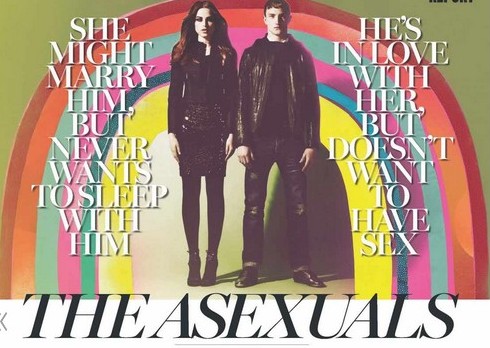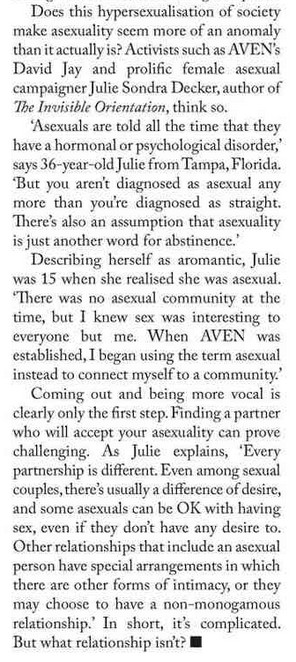Marie Claire UK did an interview with me and a few other asexual people for its December 2014 issue. You can choose your platform and download it for a small fee here (make sure to get December 2014).
 Because it is a for-sale magazine and there is no online companion, I can’t show you the whole thing, but here is my quote:
Because it is a for-sale magazine and there is no online companion, I can’t show you the whole thing, but here is my quote:
 I was interviewed through e-mail, so I was surprised that several of my quotes didn’t get what I said correct.
I was interviewed through e-mail, so I was surprised that several of my quotes didn’t get what I said correct.
Their version:
Describing herself as aromantic, Julie was 15 when she realized she was asexual. ‘There was no asexual community at the time, but I knew sex was interesting to everyone but me. When AVEN was established, I began using the term asexual instead to connect myself to a community.’
This quote implies that I used to call myself “aromantic” BUT HAVE NOW “switched” to using “asexual” because of AVEN. That’s incredibly misleading because I use both terms NOW and did not claim to use “aromantic” as a teen. Asexuality and aromanticism are not necessarily related. When I described using the word “asexual” instead, was describing my switch from the word “nonsexual,” which I always used before there was a community that preferred “asexual.”
Here is my original statement:
I identify as an asexual aromantic woman—”aromantic” meaning I also don’t feel romantic attraction. Romantic orientation is separate from sexual orientation for a great many asexual people, and some do want romantic relationships even if sexual attraction doesn’t develop for them.
This is the only place I mention “aromantic” in my set of answers, so how it got conflated for the term I switched to “instead” is beyond me.
My original response, on using “nonsexual” as a term:
I was about fifteen years old when I started calling myself “nonsexual.” There was no asexual community at the time, but I knew sex was very interesting to everyone but me, and it seemed like enough of a difference to have to call it something. When the Asexual Visibility and Education Network was established by David Jay in the early 2000s, I began using the term “asexual” instead to connect myself to the community and visibility efforts.
So you see how that really was not unclear. I don’t know how it became so in the article.
Also, they tweaked my words at one point. The interviewer asked me about dating and dating sites for asexual people. I discussed mixed-orientation dating a bit after explaining why it’s rare for asexual people to be able to date other asexual people. I wrote this:
There are resources for these mixed-orientation relationships, but every partnership is different. Even in non-asexual couples, there’s usually a difference of desire and opinion on how often and in what ways to have sex, so asexual people aren’t honestly that different, and some may be okay with having sex even if they don’t have the usual accompanying sexual attraction. Some relationships that include an asexual person have special arrangements in which they emphasize other forms of intimacy, or they may have a non-monogamous relationship, like an open marriage or a polyamorous group situation.
That was rewritten to this in the magazine:
As Julie explains, ‘Every partnership is different. Even among sexual couples, there’s usually a difference of desire, and some asexuals can be OK with having sex, even if they don’t desire to. Other relationships that include an asexual person have special arrangements in which there are other forms of intimacy, or they may choose to have a non-monogamous relationship.’
I don’t think this is necessarily a poor choice for simplifying, shortening, and summing up my response (though it lacks some nuance), but for the record, I didn’t call any couples “sexual couples.”
This is not incredibly egregious, considering how wrong many journalists have gotten it over the years, but it does really irk me that “aromantic” is represented as something I used to call myself before I found the word “asexual.” Many aromantic people are very much NOT fans of having our romantic and sexual orientations conflated. I was also assigned words I never said a couple times wherein I referred to asexual people as “asexuals,” and while I don’t object to this language, I prefer not to use it as a noun form, though I do use “aces.”
Still, I appreciated that in a popular, mainstream magazine, the article didn’t drag in some “sexpert” for “balance” to ramble about how we’re probably just refusing to face our sicknesses and trying to make an orientation out of our fear.
Note: There are also some statements in the article that could be taken as sex-shaming or promiscuity-shaming.


